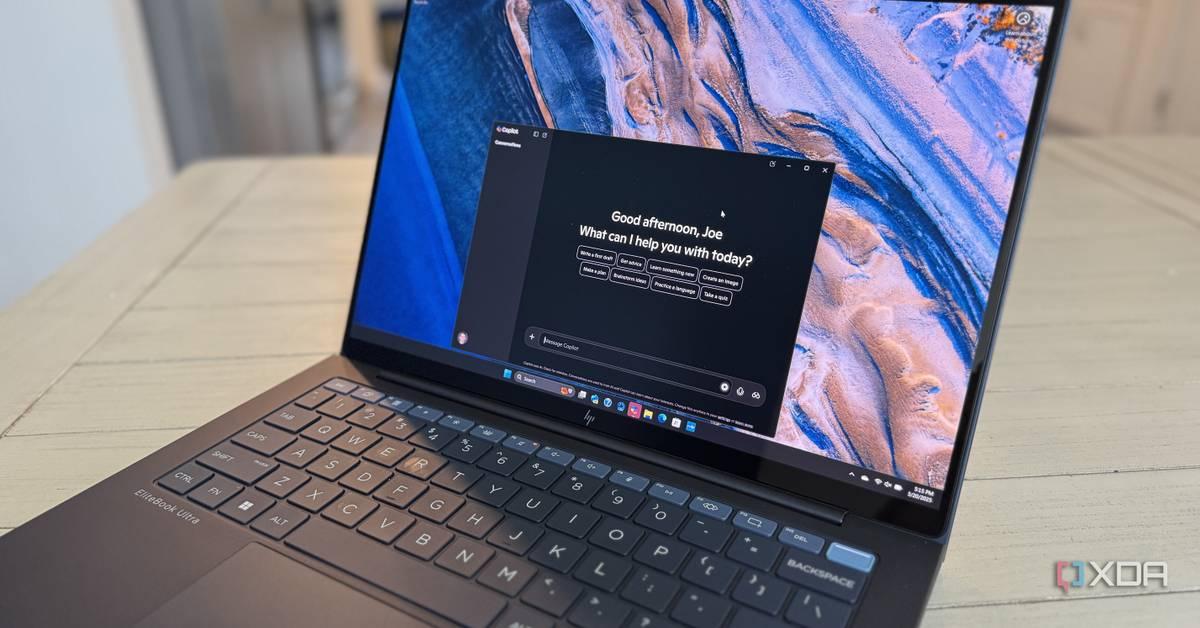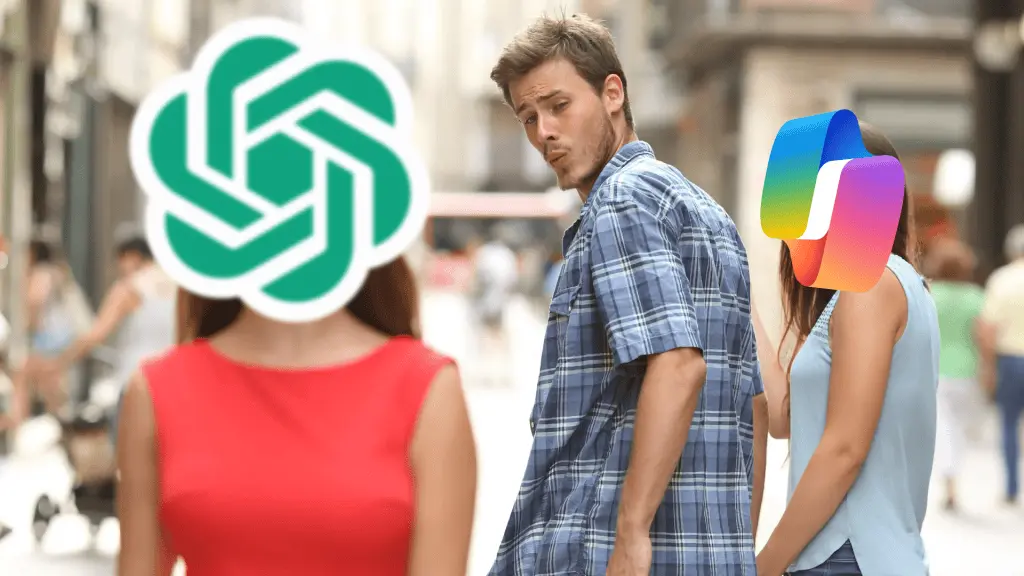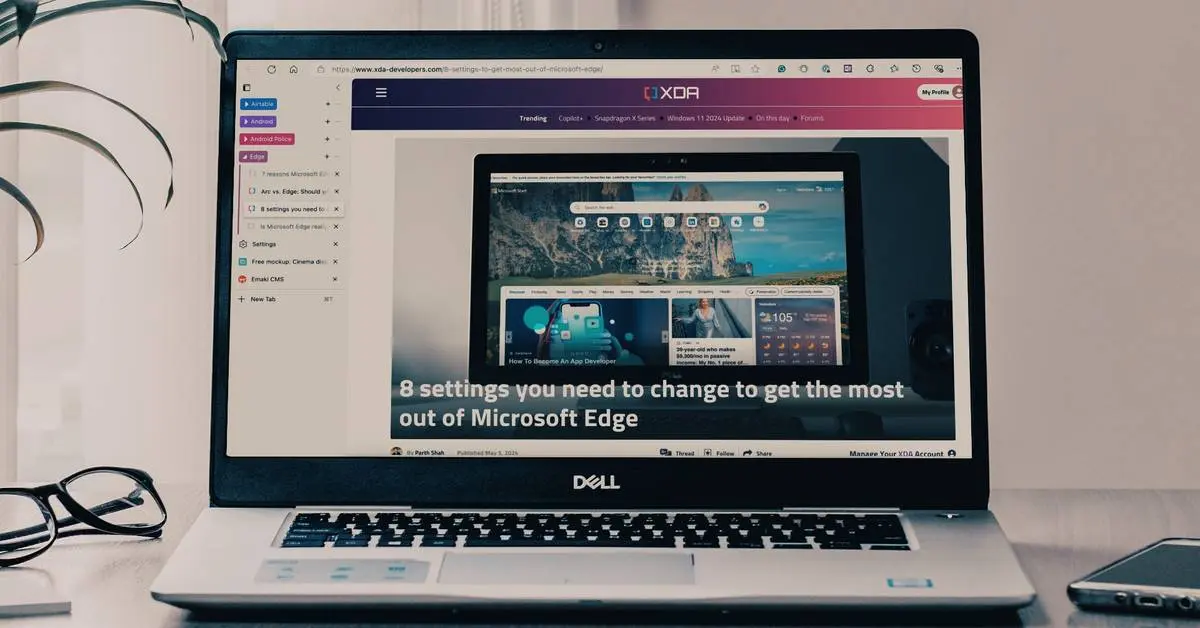Microsoft Edge's New Tactic: Nudging Users Towards Copilot AI
3 Sources
3 Sources
[1]
Microsoft has somehow found yet another way to get you to use Copilot
We've seen Microsoft try a few tricks when encouraging users to use its products. One of its favorites is detecting when you start looking around for its competitor's products and begins slowly slipping ads for its own services in there. If you've ever installed a brand new copy of Windows 11 and used Microsoft Edge to download Chrome, you'll know how much both the browser and Bing will put up a fight to convince you to stick with Microsoft's defaults. These days, Microsoft's biggest bet is on its AI assistant, Copilot. AI assistants are really expensive to deploy and run, and the Redmond giant likely wants to see a return on it sooner rather than later. There's just one problem: people tend to use Microsoft's competitors' AI tools over its own. So, it's doing what it does best and gently nudging you to use Copilot instead of its rival services. Microsoft Edge will now slowly slide Copilot toward you if it catches you using ChatGPT, Perplexity, or DeepSeek As spotted by Windows Latest, Microsoft Edge has reportedly been updated with new behavior. Now, the browser will keep an eye out for when you visit one of Copilot's rival services. Windows Latest noticed that the new behavior activated when visiting ChatGPT, Perplexity, or DeepSeek, but some (such as Gemini) weren't affected. Once Microsoft Edge detects that you're browsing one of the above sites, it deploys a sneaky little button on the address bar. The button features the outline of the Copilot logo, alongside the text "Try Copilot." If you click on it, the Copilot sidebar opens, presumably to remind you that you have an AI assistant built right into the browser. Windows Latest noted that the little button didn't appear on any other website, which does heavily imply it'll only prod you if you dare decide to use a rival product. So, why is Microsoft doing this? Well, the easy answer is just to say "Because it's Microsoft" and move on, but when you look at the current trends, you see why the company is deploying this new strategy. Windows Latest points to a recent post on X by Similarweb that claims that Microsoft Copilot has had a measly 1-2% of the AI assistant's market share for the past year straight. In fact, pretty much every major AI assistant is beating Copilot for usage, and it's likely no coincidence that the names you'll find above Microsoft's offerings are the ones getting the sneaky Copilot button added to the address bar on Edge. Maybe we'll see more people use Microsoft's AI assistant when the company lets us talk to our PCs using "Hey Copilot." But I wouldn't bet on it.
[2]
Microsoft Edge begs you to use Copilot AI instead of ChatGPT
Hey Microsoft, you should apply a little dating advice when trying to win over your users: desperation is never attractive. The company has employed Windows' built-in Edge browser as a marketing tool many times before, often in trying to convince people not to use Chrome. Now it's pulling some similar moves, begging people to use Microsoft's Copilot "AI" system rather than ChatGPT or Perplexity. If you happen to be reading this in Edge right now (hey, it's not impossible), then try heading over to ChatGPT.com, Perplexity.ai, or DeepSeek.com. You might see a little flashing banner in the URL bar inviting you to "Try Copilot." That's according to Windows Latest, which also says that you'll be seeing Copilot ads in Bing Search if you look for competing products. I'm not able to replicate the results on my own desktop (where I have Copilot turned off) or laptop, and neither are other PCWorld team members. But considering how much Microsoft has plastered Copilot over every possible surface for the last year, I'm not in any doubt that it's an active campaign for at least some users. There's a bit of irony in the prompt, since many Copilot functions use ChatGPT itself -- Microsoft and OpenAI are close partners, as ChatGPT and other systems tap into Microsoft's Azure cloud platform. But Microsoft would surely prefer that you use its own branded and integrated interface rather than the LLM/chatbot that's become phenomenally popular with web spammers, cheating students, and lawyers charging hundreds of dollars an hour to create fake case references. (And I guess some other people use ChatGPT, too.) Apparently that big push for Windows 11 isn't occupying all of the marketing team's time just yet. But I suppose it's only fair, since going to Perplexity's site opened up an ad for that company's Comet browser.
[3]
Microsoft's latest prod to use Copilot AI in the Edge browser is subtle, but still annoying - and I'm getting fed up with this
This fires up Copilot in Edge's sidebar, and the idea is to poach traffic from these rival AI services Microsoft's latest idea to promote its services is an attempt to get people who are using ChatGPT or Perplexity AI to try Copilot instead. Windows Latest reports that this is happening for those using Microsoft Edge. When you visit either the ChatGPT or Perplexity websites in Microsoft's browser, there's a button that appears on the far-right of Edge's web address bar which urges you to 'Try Copilot' instead (with a small Copilot icon next to it). It's relatively subtle - by Microsoft's standards - but visible enough, and if you click on it, Edge will open Copilot in its sidebar. Obviously, the hope is that you'll use Microsoft's AI rather than either ChatGPT or Perplexity, and therefore Microsoft is trying to poach traffic here. I tried opening both these rival AI websites in my Edge browser, and just as Windows Latest promised, this button popped up in the URL bar. Oddly enough, it didn't appear the first time I went to the ChatGPT site, but it did appear on the second visit. This appears to be happening with ChatGPT and Perplexity (plus Deepseek, the Chinese AI), but notably not with Google's Gemini AI - which seems odd, as Microsoft has no qualms about trying to warn Edge users off downloading Chrome, as we've seen in the past, and that's still true today. In fact, navigate to the Chrome download site in Edge and you'll get a full pop-up, not just a tiny icon, trying to dissuade you from defecting to Google. It explains that Edge uses the same tech as Chrome - namely the Chromium engine - but with the "added trust of Microsoft", whatever that means. So, these kinds of nudges are quite commonplace for Microsoft's browser, and indeed in the interests of fairness, Google gets up to the same kind of online cajoling in the reverse direction. At any rate, this promotion of AI isn't anything new. We've seen this kind of thing before with Microsoft trying to hijack a Bing search for rival AI services and redirect people to the Copilot AI in Edge, after all. And given Microsoft's overall big push with AI - which is now becoming very obvious with all the latest developments in Windows 11 - it's really no surprise to see more of this type of activity. That doesn't make it any less disappointing, though, as Microsoft seems to be getting increasingly heavy-handed with all its promotional tricks in Windows and Edge. That suggests the company has evidence that this kind of nudging works, but for me, it's just an annoyance, and one that makes me less likely to use any given product. Edge, Copilot, or other Microsoft services should stand on their own merit (and indeed the irony is that Edge very much does, seeing as it's our current pick for the best web browser). Incidentally, I asked ChatGPT whether it was aware of Microsoft Edge's behavior while visiting its site, and as you'd expect, the AI acknowledged reports around this - though it remained implacably neutral in terms of its general tone. Interestingly, ChatGPT did suggest turning off the Copilot button (to the right-hand side of the address bar) to get rid of this particular 'Try Copilot' nudge, and would you believe that this worked for me. With the main Copilot button disabled, I didn't see Microsoft's nag in the address bar any longer (at least in my brief testing). If you're wondering how to turn off that Copilot button, in the Edge address bar, type the following to access this part of the browser's settings: At the bottom in the 'App specific settings' panel, click on 'Copilot' and where it says 'Show Copilot button on the toolbar', turn this off. You'll no longer have a Copilot button, and hopefully won't see any Copilot-related suggestions in Edge's address bar - or at least fewer of them.
Share
Share
Copy Link
Microsoft has implemented a new feature in its Edge browser that prompts users to try Copilot when visiting rival AI websites. This move has sparked discussions about user choice and aggressive marketing tactics in the tech industry.
Microsoft Edge's New Copilot Push
Microsoft's Edge browser now subtly prompts users to engage with its Copilot AI when visiting rival AI websites like ChatGPT or Perplexity
1
. This strategic move aims to boost Copilot's adoption in the competitive AI market, reflecting Microsoft's broader ambition in the sector.
Source: XDA-Developers
Feature Mechanics and Market Context
A "Try Copilot" button appears in Edge's address bar when users browse competitor AI platforms. Clicking it opens the Copilot sidebar, offering Microsoft's AI directly
1
. This aggressive tactic stems from Copilot's modest 1-2% AI assistant market share, far behind competitors1
, pushing Microsoft to expand its user base.User Response and Ethical Questions
The persistent nudging has generated debate among users and tech commentators. Many view it as intrusive, raising ethical questions about forced promotional tactics within a browser . Critics argue AI tools should succeed on merit, not through such prompts.

Source: PCWorld
Related Stories
Disabling the Prompt and Broader Strategy
Users can disable the Copilot button in Edge's settings, ensuring a preferred browsing experience free from unsolicited AI suggestions . This feature is part of Microsoft's extensive strategy to embed AI across its ecosystem, including Windows 11 and productivity tools
2
, signifying its strong ambition in the AI revolution.Industry Parallels and Future Outlook
Similar competitive strategies are common among tech giants, like Google, to retain user engagement. As AI integration grows, these tactics will likely intensify, leading to ongoing discussions about user choice and fair competition in the digital age .
References
Summarized by
Navi
[1]
Related Stories
Microsoft Pushes Copilot AI in Bing Search Results, Raising Concerns Over Competitive Practices
05 Aug 2025•Technology

Microsoft's Controversial Tactics: Promoting Copilot Over Rival AI Services in Bing Search Results
06 Mar 2025•Technology

Microsoft Edge gets Copilot-inspired redesign that users can't disable, sparking backlash
06 Jan 2026•Technology

Recent Highlights
1
Google Gemini 3.1 Pro doubles reasoning score, beats rivals in key AI benchmarks
Technology

2
Meta strikes up to $100 billion AI chips deal with AMD, could acquire 10% stake in chipmaker
Technology

3
Pentagon threatens Anthropic with supply chain risk label over AI safeguards for military use
Policy and Regulation





